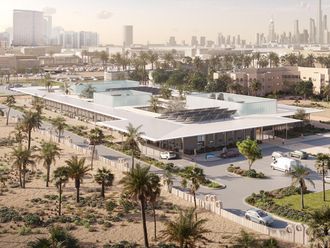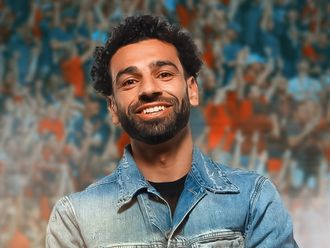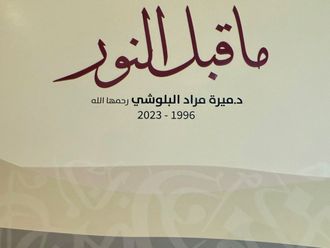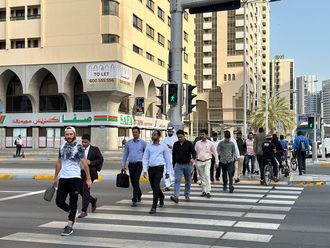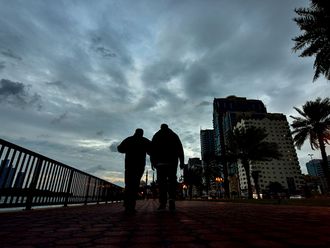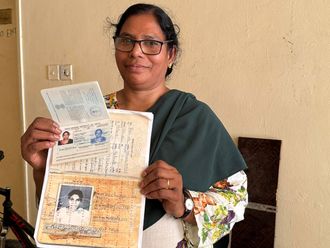Hajj Metwalli is a wealthy merchant who has stirred debate in the Arab world during the whole month of Ramadan. His lifestyle and approach to marriage have become the focal point of discussion in many gatherings. Some support the way he lives his life; others strongly oppose it.
Hajj Metwalli is the main character in the Egyptian soap opera The Family of Hajj Metwalli.
Renowned Egyptian actor Noor El Shereef plays Metwalli. The episodes were aired on numerous Arab television channels and have drawn large audiences throughout the Arab world.
The drama revolves around the life of Hajj Metwalli and his continuous pursuit of a new wife, in addition to his previous ones. All of his four wives live in luxury and in the same building, yet in separate apartments.
The episodes depict how the wives live harmoniously together and how Metwalli is a fair husband who pays each wife a visit, according to a rigid schedule. In re-marrying, not only does Metwalli pursue beauty and youth, but wealth as well. The wives, in turn, try endlessly to win Metwalli's heart and his time.
Actor El Shereef, in an interview with the BBC, insisted that the character he plays is real and not fictional. He adds that second marriages are common in the Gulf region.
"There are more than a million second marriages in Egypt. In Syria and Lebanon it may be unusual, and in Tunisia it is outlawed," said El Shereef.
When asked what his wife, who is also an actress, thinks of the role he plays, he laughingly says she feels provoked and questions why he has accepted such a part. The reason, explains El Shereef, is because he would like people to look closely at the problems faced by young men and women who would like to get married but are unable to afford the costs involved.
But Metwalli's lifestyle has drawn criticism as well. Egyptian women parliamentarians have expressed their anger and said the episodes do not reflect the reality of Egyptian society, where polygamy is not common. They said they have learned how dangerous the glorifying of such a character could become, through the letters of protest they have received from women viewers. They fear the drama will have a negative impact on their marriages, one way or the other.
The criticism was strong enough for Saudi husbands to opt to see the episodes outside their homes, out of fear of their wives, writes Dawood Al Shurayaan in Alhayaat. But women viewers, to a large extent, are justified in their fears, says Al Shurayaan. The idea of polygamy is religiously supported and could easily be defended and justified. In addition, men's exaltation of Hajj Metwalli's role has doubled the possibility of the return of such a character in society.
Writing in Al-Seyassah, Dr. Ma'soma Al Mubarak, agrees with the opposing position taken by the Women's National Council.
Hajj Metwalli's character reflects a biased Orientalist view. He is a man who carefully selects his next beautiful, young, wealthy wife and eventually destroys every humane aspect of her character, says Dr. Al Mubarak.
He denies her the freedom to choose and the right to object, using the cloak of religion as an excuse. And in the name of Islam, adds Dr. Al Mubarak, he allows himself to do what he has forbidden others to follow.
Hajj Metwalli is a moody tyrant and an opportunist, and as such, the character really exposes the hidden desire of the masculine Arab mind to be absolute master in society, adds Dr. Al Mubarak. The episodes carry within them, believes Dr. Al Mubarak, a message of social acceptance of a women's slave market, from which Hajj Metwalli chooses the woman he desires.
Not only has the drama glorified such a character, it has also presented a positive image of someone who violates the rights of others.
Mohammed Zain, writing in Al-Seyassah, agrees that what we have seen in the episodes of The Family of Hajj Metwalli is a depiction not of a normal family. Instead, we see an elderly man treating his wives as if they are the Sultan's harem, or slaves.
Exactly what kind of ethics is this soap opera trying to embody? questions Zain. The illiterate Hajj Metwalli has accumulated his wealth through opportunism.
Throughout the story so far all that he is preoccupied with is increasing his wealth by remarrying, says Zain. With each marriage, the character insists he is able, with his money, to buy the most beautiful woman who accepts him as a husband without questioning.
This has happened with all his wives, says Zain, regardless of their social and educational background.
Unfortunately, the drama will create a deep psychological shock to the Egyptian youth, adds Zain.
In reality, they are not able to afford the financial cost of getting married. Thousands of them are not able to acquire an apartment to start a family, which is a serious problem in Egyptian society, says Zain.
The only value that Hajj Metwalli advocates, believes Zain, is the importance of material gain. It is the only justifiable goal in life. It is as if Hajj Metwalli is calling on our youth to rid themselves of the greatest value inherited from our ancestors, which is education, adds Zain. Instead, they should look for money so that they are able to marry two, three or four wives.
If Arab men follow Hajj Metwalli's example, then a serious social problem is in the making, which all Arab societies will have to deal with, concludes Zain.
Such a problem is already depicted in the series, writes Adil Hmouda in Al Bayan. This is what happened when Hajj Metwalli sets out to marry the same woman his son has fallen in love with.
Who wins in this case, questions Hmouda – the son's love, or his father's wealth?
Unfortunately, all the women in the drama, says Hmouda, are depicted as hopeless, speechless and submissive. This is what happens when a woman gives up her position as the sole claimant to her husband's attention, and allows other women to share him.
What is interesting though, says Hmouda, is that the woman herself helps bring about such a situation and accepts it as well. When a woman agrees to share her husband with another woman, it means two women get half a man each. And half a man, says, Hmouda, deserves nothing more than half a woman. The danger of what the Arab world has been watching in 'The Family of Hajj Metwalli', is the fact that drama can lead to societal change. In this case, says Hmouda, it could lead to change for the worse.
The family of Hajj Metwalli makes waves in Arab world
Hajj Metwalli is a wealthy merchant who has stirred debate in the Arab world during the whole month of Ramadan. His lifestyle and approach to marriage have become the focal point of discussion in many gatherings.


